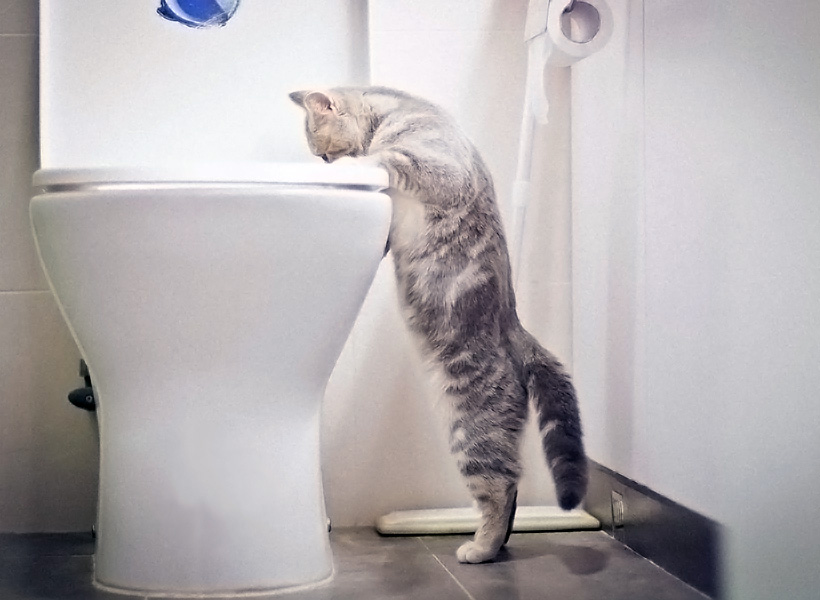The Dangers of Flushing Cat Poop Down Your Toilet - Advice for Better Handling
The Dangers of Flushing Cat Poop Down Your Toilet - Advice for Better Handling
Blog Article
Almost everyone seems to have their personal way of thinking when it comes to Can You Flush Cat Poop Down The Toilet?.

Intro
As pet cat proprietors, it's essential to bear in mind just how we dispose of our feline buddies' waste. While it may seem convenient to purge pet cat poop down the bathroom, this method can have harmful consequences for both the setting and human wellness.
Alternatives to Flushing
Luckily, there are safer and more liable ways to dispose of pet cat poop. Think about the adhering to options:
1. Scoop and Dispose in Trash
One of the most typical approach of throwing away cat poop is to scoop it right into a biodegradable bag and throw it in the garbage. Be sure to utilize a dedicated litter scoop and throw away the waste promptly.
2. Use Biodegradable Litter
Select eco-friendly cat clutter made from products such as corn or wheat. These litters are environmentally friendly and can be safely taken care of in the garbage.
3. Hide in the Yard
If you have a backyard, take into consideration burying feline waste in a marked location far from vegetable gardens and water sources. Be sure to dig deep enough to prevent contamination of groundwater.
4. Install a Pet Waste Disposal System
Invest in a pet garbage disposal system especially made for pet cat waste. These systems utilize enzymes to break down the waste, decreasing odor and ecological influence.
Health and wellness Risks
In addition to environmental problems, purging pet cat waste can additionally pose health and wellness risks to human beings. Pet cat feces may contain Toxoplasma gondii, a bloodsucker that can trigger toxoplasmosis-- a potentially extreme health problem, specifically for pregnant females and individuals with weakened body immune systems.
Environmental Impact
Flushing cat poop introduces unsafe virus and parasites into the supply of water, presenting a substantial risk to water ecosystems. These impurities can adversely impact aquatic life and compromise water high quality.
Verdict
Accountable animal possession extends past providing food and sanctuary-- it additionally includes correct waste management. By refraining from flushing feline poop down the toilet and choosing different disposal methods, we can lessen our ecological impact and secure human health and wellness.
Why You Should Never Flush Cat Poop Down the Toilet
A rose by any other name might smell as sweet, but not all poop is created equal. Toilets, and our sewage systems, are designed for human excrement, not animal waste. It might seem like it couldn’t hurt to toss cat feces into the loo, but it’s not a good idea to flush cat poop in the toilet.
First and foremost, assuming your cat uses a litter box, any waste is going to have litter on it. And even the smallest amount of litter can wreak havoc on plumbing.
Over time, small amounts build up, filling up your septic system. Most litter sold today is clumping; it is made from a type of clay that hardens when it gets wet. Ever tried to scrape old clumps from the bottom of a litter box? You know just how cement-hard it can get!
Now imagine just a small clump of that stuck in your pipes. A simple de-clogger like Drano isn’t going to cut it. And that means it’s going to cost you big time to fix it.
Parasitic Contamination
Believe it or not, your healthy kitty may be harboring a nasty parasite. Only cats excrete Toxoplasma in their feces. Yet it rarely causes serious health issues in the cats that are infected. Most people will be fine too if infected. Only pregnant women and people with compromised immune systems are at risk. (If you’ve ever heard how women who are expecting are excused from litter cleaning duty, Toxoplasma is why.)
But other animals may have a problem if infected with the parasite. And human water treatment systems aren’t designed to handle it. As a result, the systems don’t remove the parasite before discharging wastewater into local waterways. Fish, shellfish, and other marine life — otters in particular — are susceptible to toxoplasma. If exposed, most will end up with brain damage and many will die.
Depending on the species of fish, they may end up on someone’s fish hook and, ultimately on someone’s dinner plate. If that someone has a chronic illness, they’re at risk.
Skip the Toilet Training
We know there are folks out there who like to toilet train their cats. And we give them props, it takes a lot of work. But thanks to the toxoplasma, it’s not a good idea.

Do you enjoy reading about How to Dispose of Cat Poop and Litter Without Plastic Bags? Try leaving a remark below. We will be glad to listen to your views about this page. We hope that you visit us again soon. Sharing is caring. You never know, you may very well be helping someone out. I truly appreciate reading our article about How to Dispose of Cat Poop and Litter Without Plastic Bags.
Request Your Service Report this page